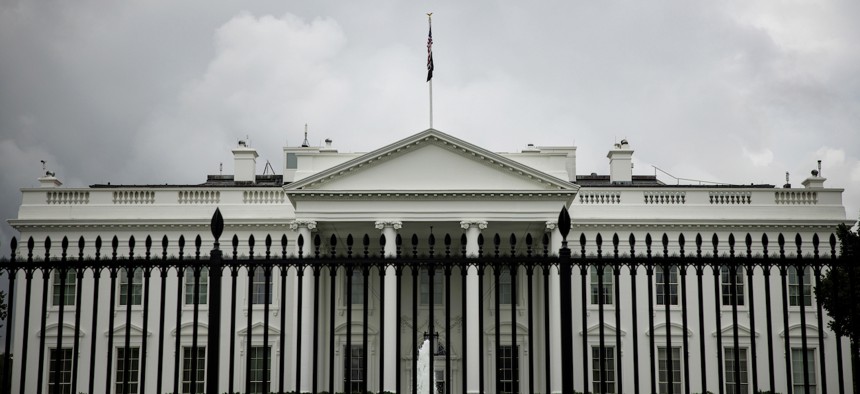
Attacks on the federal civil service are increasing as the 2024 presidential election draws closer. Samuel Corum/Getty Images
Deconstructing the administrative state: At what cost?
COMMENTARY | Americans should be frightened by the prospect of a return to the spoils system, argue two scholars.
Although we are early in the 2024 presidential race, attacks on the federal civil service are moving full steam ahead. Gov. Ron DeSantis, R-Fla., speaks of “slitting throats on day one.” Former President Donald Trump has railed against the “deep state” and vows to vanquish it if he is returned to office in 2025. Vivek Ramaswamy advances the most aggressive case for deconstruction. He favors ending civil service protections for federal employees and imposing 8-year term limits on federal jobs.
One weapon both Trump and DeSantis promise to use to deconstruct the administrative state is Schedule F, a new job category established in October 2020 by Executive Order 13957. It allows federal agencies to convert certain civil service positions to Schedule F, which makes them at-will appointments and removes rights to appeal. Although President Trump initiated Schedule F, the executive order was rescinded by President Biden on Jan. 22, 2021.
Proponents of Schedule F believe that it would enhance government performance and accountability by making it easier to fire poor performers and careerists who have overstepped their authority. Opponents of Schedule F argue that the policy would return the federal government to a spoils system in which a president can reward supporters with jobs and fire political enemies.
Given this divide, we sought to identify consequences of reviving Schedule F. We reviewed three decades of research about how merit principles—meritocratic hiring and promotion—and civil service protections—i.e., job security—affect government performance. We identified 96 peer-reviewed articles, drawing upon results from more than 150 countries around the world.
We find that meritocratic appointments, tenure protection and professionalism are strongly associated with higher government performance and lower corruption. Our findings are unequivocal: converting career employees to Schedule F, thereby removing rules for meritocratic appointments and protections from politicization, is highly likely to degrade government performance.
Why do merit principles make a difference for government performance and the integrity of civil service, not only in the U.S. but in many other countries around the world? Researchers offer many explanations, but two answers dominate. First, the competence of civil servants is essential for modern government performance. As Michael Lewis illustrates in The Fifth Risk, experts in organizations as diverse as the Departments of Energy, Agriculture, and Commerce are central to the accomplishments of these agencies.
A second contribution of merit principles is that they buttress the rule of law, facilitating fundamental checks and balances built into the U.S. constitutional system. Rules governing civil servants are a check on the morally hazardous behavior of politicians. Civil servants do not merely execute policy. They are obligated to act with fidelity to the legislature’s intent in creating policies and the judiciary’s obligation to sustain the constitutional order. The oath federal employees take testifies to their transcendent roles as stewards for each branch in our constitutional system. They swear to “support and defend the Constitution” and “faithfully discharge the duties of the office.”
Recent events illustrate how civil servants buttress the rule of law. What put Donald Trump at odds with Col. Alexander Vindman, Amb. Marie Yovanovitch, and FBI agents searching Mar-a-Lago? They all insisted on executing policy consistent with the rule of law, laws approved by Congress to support Ukraine’s evolution toward democracy, undermine corrupt behavior in Ukraine, and serve a judicially authorized search warrant.
The cost of reviving Schedule F will be a race to incompetent government, diminished checks and balances within our constitutional structure, and rule by powerful would-be autocrats rather than law. We recognize Americans have instinctively, and probably rightly, feared public power—especially that exercised by bureaucrats—since the republic’s founding. But Americans should be more frightened by the prospect of a return to the spoils system.
James L. Perry is a Distinguished Professor Emeritus, Paul H. O’Neill School of Public and Environmental Affairs, Indiana University, Bloomington.
Gordon Abner is an Assistant Professor, Lyndon B. Johnson School of Public Affairs, University of Texas, Austin.






